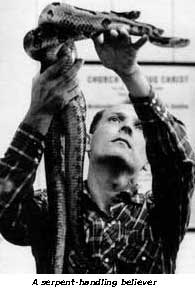Fourth Way Perspectives
Book Review
Salvation on Sand Mountain
by Dennis Covington
Addison-Wesley Publishing Co, 1995

What would it be like to intentionally handle a poisonous serpent? Why would a person do that and would it change them? Dennis Covington answers these questions and many more in recounting his personal journey into a world where snake handling, its ridicule, mortal danger, and ecstasy, is an accepted part of a religious practice—a fundamentalist way of self-transformation in the name of Jesus Christ. A freelance journalist, Covington's interest had been piqued when he read of a preacher arrested for the attempted murder of his wife by making her put her hands in a box filled with poisonous serpents. He headed off to Scottsborough, Alabama, to cover the trial, but soon found himself attending church services with snake-handling preachers and their parishioners.
Well-written, sensitive and perceptive, Salvation on Sand Mountain begins with the sense of the author's not knowing, a state which remains long enough to allow him to cross many lines, social and psychological. In the strange, hard-scrabble world of snake-handling believers, Covington unexpectedly experiences an acceptance, honesty, friendship and love he has rarely, if ever, known. But coming to a higher intensity of vibration where the question of Who am I? becomes urgently alive for him, he falls asleep again under the authority of the author's 'I-that-knows' which resurfaces during a church service to rebuke his new found friends and their way of life. So justified, the old 'Dennis Covington' can now return to the familiarity and respectability of his former world. Or so he thinks....
Over a two-year period the author witnessed the sacred through the snake-handling services in Appalachia. A Southerner himself, Covington brings to life the flavor of the South and its snake-handling believers. He sees them as "spiritual nomads from the high country.... They spoke in tongues, anointed one another with oil in order to be healed, and when instructed by the Holy Ghost, drank poison, held fire, and took up poisonous snakes." Poor but devout, they were members of churches known as "Holiness" and formed a close-knit yet fluid family of believers spanning the states of Alabama, Georgia, Tennessee, Kentucky and West Virginia.
From Covington's first encounter with the Holiness people, he was touched—something connected and called to him. A seasoned war correspondent whose dispatches regularly appeared in the New York Times, Covington's view of himself and the world he takes to be real begins to shake and shift as the snake-handling services open him to something within himself that is radically new, powerful and mysterious. Of his spiritual condition at the outset of his journey he writes: "I had my life, my family, my sobriety. But something was missing. I had reached that point in the middle of looking for something when you have forgotten what it is you have lost." So again and again he returns to the Holiness services remaining open and allowing what he experiences to live in him.
Sister Aline & the Holy Ghost
Covington's 'voice' in the passages when the author moves from observing to connecting with the experience of one of the Sisters, allows the reader to sense and feel the shifting, dancing, modulating energies, as well as the wonder and terror of the unknowing and painfully ecstatic qualities. Such an instance occurs at a Brush Arbor gathering when Sister Aline, feeling the Holy Ghost, begins uttering sounds. Writes Covington, "I could not disentangle myself from the sound of her voice, the same syllables repeated with endless variation. At times, it seemed something barbed was being pulled from her throat; at other times, the sound was a clear stream flowing outward into thin air. Her voice seemed to be right in my ear. It was a sobbing. A panting after something she could not quite reach. And then it would be a coming to rest in some exquisite space, a place so tender it could not be touched...."

